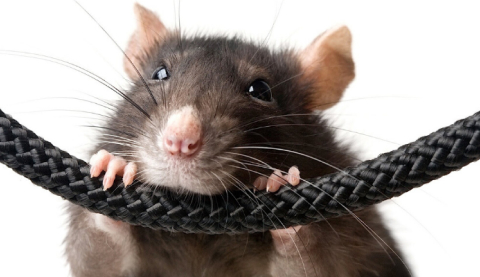Among all house pests, raccoons are considered to be one of the smartest and cunning out of all. They are known to be adapted in all areas, able to open doors, destroy wires, and slip inside houses to track down food sources for them ravage through. They are not one to simply enter houses while mindlessly leaving their traces behind. They are known to be even more abundant in urban areas rather than in rural areas, which is a contrast from most pests who prefer to have more space for roaming around. This means that they have easily adapted to the lifestyle of humans. We always recommend to get help from a professional raccoon removal expert.
How do you get rid of them?
1. Raccoon baits
Raccoons are attracted inside the house with 1) an exposed food source and 2) an unsanitary condition. Combine these two and you’re basically asking for them to come inside your house.
However, the food source is not limited to actual human food. In fact, just leaving your garbage exposed to the outside can bait these raccoons. After all, they are not picky eaters. They will eat anything that is not entirely toxic.
To successfully bait and trap a raccoon, you must look for foods that are aromatic and easy to spot. Examples of this include meat, fish, peanut butter, and dog food. These foods are sure to attract racoons, especially the peanut butter (because of its smell).
Raccoon traps are usually illegal for most states. This is because most are inexperienced with trapping raccoons. Because they are smart, they usually manage to slip by these traps or if manage to injure themselves while attempting to do so. Because of this, wildlife conservation acts make it illegal for people to try to attempt them and relocate them.
Be sure to check the laws in your state about trapping first before attempting to do so. In the end, the best people to do the trapping is wildlife removal services.
2. Rodent repellents
Even though they are present in the most unsanitary places, some natural ingredients still repel these pests. After exterminating them from your house, you should start putting some repellents to make sure that they don’t return. Aside from the most basic tip of making sure that your house is clean and to cover all entry points for raccoons inside your house, you should also put some natural repellents inside your house or garden.
For starters, peppermint oil is very effective against racoons. The smell of it naturally repels them as for some reason, they really hate the smell of it. Other repellents include pepper and cloves.
Another natural repellent is using the urine of natural predators. Analyze the food chain and you will see that raccoons are placed amongst the bottom of it. This means that a lot of predators naturally hunt for them, and using their urine might be to your advantage. If you have cats in your house, you might consider emptying their litter box at places where chipmunks usually goes to. Other predator urines can also be bought online, some of which include coyote urine and wolf urine.
If you are one to experiment products, you may also try devices that radiate sonic waves to repel raccoons. Though many are skeptical about its promised effects, some also claim that the product is useful. Natural repellents may be more effective for raccoons, but it may also be worth a shot to try electric gadgets like these.
3. Rodent poison
Raccoon poisons are available everywhere commercially. They claim to be effective in killing raccoons and controlling their population inside your house. Some of the most recommended ways of using this is to pour it on raccoons baits that are placed near their nests.
However, before using raccoon poison, one must consider its effects afterwards. Not all raccoon poisons work quickly, after all, and most of them will take some time first before being effective. After eating food that has been poisons, raccoons may still be able to move for a while, which means that they can still hide in small spaces inside your houses before they ultimately die.
That spells disaster for most people as raccoons can be skillful in hiding between spaces that are hard to reach. If a raccoon happens to die within a wall or behind furniture that are hard to move, you may have to call for professional help afterwards just to take care of your problem.
Another bad effect with poisoning raccoons is the possibility of killing more than the animal itself. Since raccoons are naturally hunted by animals like foxes and large eagles, you may risk the lives of the latter if they happen to come by raccoons that are already sluggish and weak from poison. In the end, you might poison the predators and kill more than what was necessary.
In the end, what makes raccoon poison better to be avoided is the risks that comes with it and the unpredictability of the time of death of the raccoon after.
1. Wire mesh
To make sure that gophers will not visit your house, you must install wire meshes around your property. Aside from avoiding raccoons, it may also avoid other pests like voles and squirrels enter your property.
Where they stay in houses
Because they easily adapted to the lifestyle of humans, they are known to enter homes to steal food. Usually, they are attracted to those that have exposed food sources. This may be from the smell of kitchens that have dirty dishes or houses that have openly exposed dog or cat food. They usually hunt for this, the smell attracting them from far away.
When a raccoon sees the possibility of food, they usually go at the first chance. This may come in the form of open windows, dog doors, or through holes in the walls that they themselves may make. They are known to enter houses to live inside attics or chimneys. Basically, if a house presents itself to be hospital for them, they will instantly live inside it and reside in the areas that are far from humans. There, they may start to create families of baby raccoons, multiplying their population as long as food is available for them. This may cause huge headaches for the human inhabitants of the house.
The dangers of them living inside your house
Raccoons are known as wild animals, which means that their droppings and fur carries a lot of diseases. Their droppings may have ringworms on it which can easily transfer to a human host. This is also known as raccoon ringworm. This may mean a heavier and uptight maintenance for your attic as fungi and other diseases may follow next if these droppings are left untreated.
Aside from this, their fur are also known to carry lice and ticks which may also bite humans. Although they may look like pets because of their resemblance to tiny bears, they are actually not as clean as they look. Remember that they rummage around garbage and trash, which means that they are not that conscious of the dirt in their bodies. If children happen to meet one by accident, they may be attracted to touch it, which may in turn leave them with tick or bug bites.
Also, raccoons are susceptible to have rabies. Rabies is a very dangerous virus that kills their host after a short period of displaying wild behaviour. The good news is that the virus is not easily transferrable to humans as that may only happen during its last stages which is usually the time when they are close to dying (drooling, with limbs that are hard to move). This means that they will become uncharacteristically sluggish, making it harder for you to become in contact with them. If you happen to see one though, it will be best for you to avoid it.
Having raccoons in your attic may spell the weakening of the structure for you. Their droppings may cause the floors to become weaker (along with carrying a lot of diseases). They are also known to destroy walls, tear through duct tapes, and rip of wallpapers. This is a reason for you to prioritize eradicating them as quickly as you can.
Another danger that comes with them being in your attic is the fact that their population may grow while inside your house. A single racoon is already a headache on its own. Having multiple of them may spell disaster for you. Another problem attached with it is the fact that if you happen to trap a parent raccoon and relocate them, you may be left with little ones that have no one get food from. This may kill them, and in turn, make your attic smell bad from the decomposing animal bodies.
Behavior
Raccoons are known for being smart thieves that target people’s garbage and trash. They are known to easily navigate through homes, knowing exactly where the food storages are. Because of this, they are usually hard to capture.
Raccoons are smart enough as to be familiar with human behaviour around the house, remembering particular places where food may be available.
Raccoons are known to be nocturnal creatures, which means that they usually operate during the night. Because of this, they are hard to capture if you plan to do it by hand. Also, this makes it harder for humans to determine if it is really a raccoon as other pests may also be culprits for food that disappear during the night (similar pests include rats and squirrels).
If you happen to see raccoons during the day (some people may see interpret this as them being rabid, which may sometimes be true), it may sometimes be just natural. Think of it as a human having a midnight snack of some sorts. (Disclaimer: it might still be dangerous to touch them or to become in contact with them so be sure to avoid them if you happen to see them during the day).
If you hear the dogs barking at night along with garbage that are rummaged through during the day, it might be a sign that a raccoon is frequenting your property. After all, they aren’t easily scared by household pets like cats or dogs. They are also not afraid of humans which makes it a hard task for some to eradicate them without any violence.
How much is to remove raccoons?
The price for removing raccoons will depend upon your chose method. Out of all the recommended removal methods, wire meshes are the most effective. However, using it will bear the most effective results. Second in price are raccoon repellents as some of them needs to be bought in the market for it to be applied in large quantities. Third is the raccoon poison as it also needs to be bought. It is not recommended to use them, though. The cheapest out of all them are raccoon baits.
The best way to remove raccoons
In the end, if you don’t have enough skills in catching pests within your property, it will be better for you to call for removal services. They are experts in catching pests, repelling them, and making sure that they don’t come back to your property.
Appearance
Raccoons are distinguishable by their face which is described as one that has a “mask”, which is unique for them. They are known to have black fur below their eyes. Their snouts can also be compared to canines, mostly the fox. Their tails are notable for being ringed. They are often colored brown to gray.
Children are often attracted to them because of their friendly faces which resemble small bears or foxes. However, they shouldn’t be touched because of the diseases and lice that are present in their bodies. They may also act hostile and may bite if surprised.
Their teeth are also sharp. They mostly use this for biting for food instead of attacking other creatures. They also have long whiskers. Their hands are particularly adept for scavenging through items, which may explain their behavior of going through garbage.
Biology
Raccoons are mammals that are best known for their faces, which are often themes of design for tribes back in the day. Their striped tails, the masks in their faces, and their overall appeal mostly distinguishes them.
They are moderately heavy, the heaviest of them being around 26 kilograms. They belong to the procyonidae family which includes olingos, ringtails, and coatis.
Raccoons are known to be omnivores, which means that they eat both plants and meat.
Additional tip for getting rid of raccoons
- If raccoons manage to enter your house and stay inside your attic, it will be better for you to take them by hand or trap them from there. Be sure to catch them quickly, though, as they can be fast and can easily hide in the parts of the room that is hard to reach.
- Raccoons are easy to trap in cages as they are opportunistic feeders and will readily go to any available source of food. They also easily enter cages without hesitation.
- If you manage to find raccoons inside your house, you must immediately look for their entry holes. After all, the fact that they entered your house shows that there might be a structural problem in your house. For example, low-lying windows and small wall cracks can be a sign. For those that cannot be covered with concrete or wood for ventilation purposes, you may try putting wires over them to make sure that raccoons cannot squeeze past it.
- Raccoons can also target your root crops and the likes. If you notice raccoons entering your garden to steal these from you, you may try setting up wire meshes to make sure that they do not cross over. Aside from this, you may also try putting these away from where raccoons usually go. This might make you safe from raccoons, but other pests that can burrow underground can still be a problem for you, though.
- As mentioned above, common repellents like mothballs and predator urine are usually put by some as to drive pests away. However, most of them are actually ineffective because of these creatures’ tolerance to smell. After all, they hunt for food in the garbage, meaning that they are not picky in any way. A particular strong smell won’t bother them.
- Raccoons are very smart pests, which means that they’ll probably be able to memorize the interior of your house if they manage to sneak inside it for a few times. Because of this, you must immediately target the pest problem inside your house to prevent making the extermination process harder.
Raccoon babies
If raccoons manage to sneak inside your house and into your attic, there’s a good chance that they’re probably turning it into their home. Because of this, they will mate and give birth there, which may spell disaster for you if the parent raccoons die. Without their parents, the younger raccoons will die and decompose in your attic, which may cause further problems for you.
They usually mate during the winter up to the spring.
Q&A
1. How do you get rid of raccoons in the attic?
Raccoons in the attic can be removed by using traps. Do not use poison to kill them as their corpses may leave a smell that will linger in your house even after being removed. It is also more humane to simply trap them and release them outside after.
It is also a good idea to call for wildlife removal services if you aren’t skilled enough as to build a trap in your attic as it may be illegal in some states to trap them.
2. How do you get rid of raccoons in your garage?
Raccoons are removed from your garage with the same way with how you remove them in your attic, which is through traps (if legal). To avoid them from coming back, make sure to seal all entry points.
3. What do raccoons eat?
They are omnivores, which means that they eat both plants and meat. They eat berries, fruits, snails, dog food, etc. They are also known to go through people’s garbage to look for food.
4. Can raccoons get rabies?
Yes, they do. Raccoons that are rabid may be distinguished by their lethargic actions, drooling, and basically acting different. It will be best for you to avoid them at all costs to avoid being infected with the virus.
5. Where do raccoons live?
Raccoons easily adapted to the urban expansion, which is why they can live almost anywhere. They are mostly found in yards, barns, and other areas.
6. Do raccoons carry diseases?
Raccoons carry a lot of diseases, which is why you shouldn’t touch wild ones. Their droppings may contain ringworms and their fur may contain lice and ticks that may bite humans.
7. Are raccoons nocturnal?
Raccoons are nocturnal creatures, meaning they prefer to be awake during the night. This is the reason why garbage bins in some houses become scavenged in the night. This is also the reason why some dogs bark loudly in the night.
Raccoon removal services
In the end, gaining knowledge about raccoons, from their habitat, diet, and general behaviour will definitely aid you in trying to get rid of them. However, in the end, it may still be the best decision for you to call for wildlife control services. After all, some states have strict laws about dealing with wildlife, which is why it is better to call for professional services.





